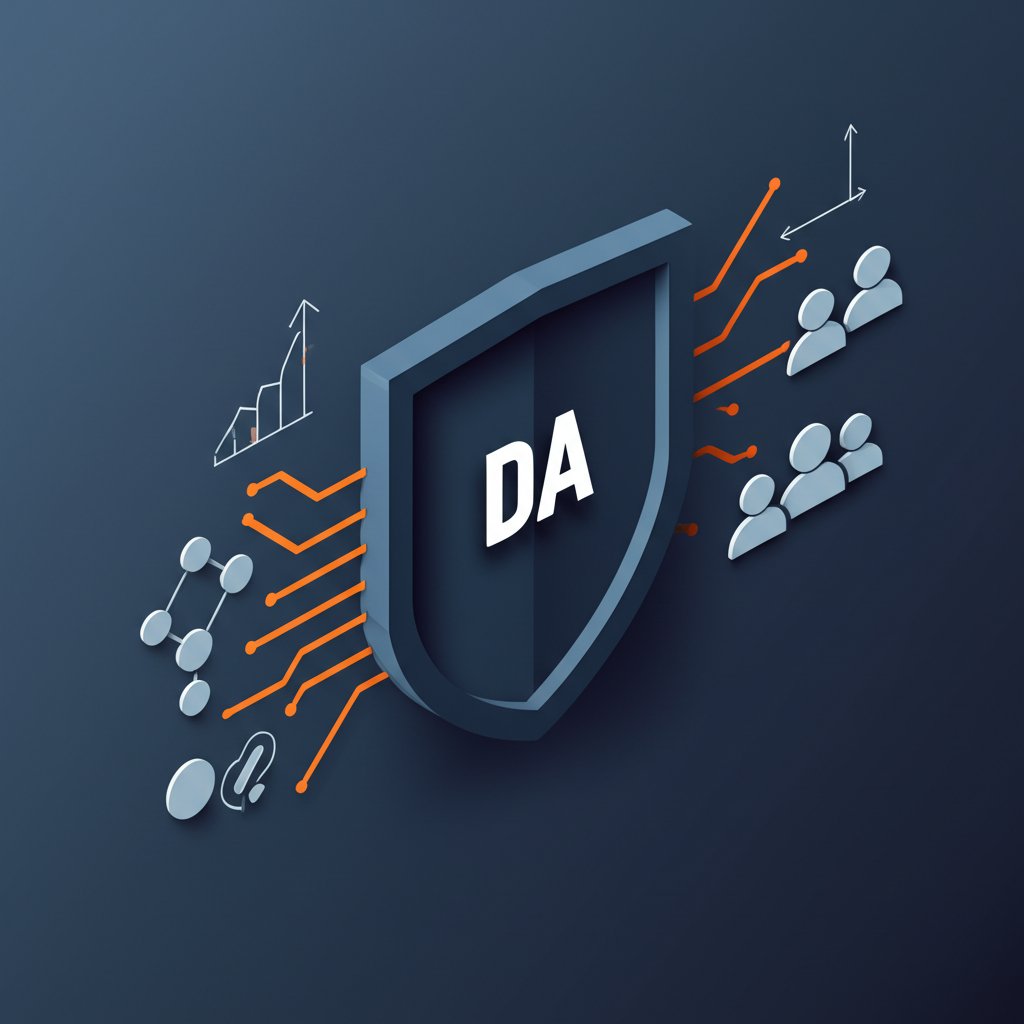TL;DR
Improving your Domain Authority (DA) is a long-term SEO strategy that signals your site's ranking potential to search engines. The process hinges on three core pillars: consistently acquiring high-quality backlinks from reputable websites, creating exceptional, link-worthy content that serves user needs, and maintaining a technically sound, user-friendly website. Success requires patience, as meaningful DA growth often takes several months of sustained effort.
Decoding Domain Authority: What It Is and Why It Matters
Domain Authority (DA) is a search engine ranking score developed by the SEO software company Moz that predicts how likely a website is to rank on search engine result pages (SERPs). The score ranges from one to 100, with higher scores corresponding to a greater ability to rank. It's crucial to understand that DA is not a ranking factor used by Google. Instead, it's a comparative metric that helps you gauge your site's strength relative to your competitors. A 'good' score is simply one that is higher than the domains you're competing against.
Think of it as a credit score for your website. A higher score suggests greater trustworthiness and credibility, making it a useful benchmark for your SEO efforts. However, DA is just one of several industry metrics. Other major SEO tools have their own proprietary scores, such as Ahrefs' Domain Rating (DR) and Semrush's Authority Score (AS). While they all aim to measure a site's authority, their calculations differ, leading to varying scores for the same website across different platforms. For example, Backlinko notes their site has a DA of 74, but a DR of 90.
Because these metrics are calculated differently, it's more important to focus on the underlying principles they represent—a strong backlink profile and a healthy site—rather than obsessing over a specific number. The primary value of DA is in competitive analysis. By comparing your score to your rivals, you can set realistic SEO goals and identify opportunities to strengthen your online presence.
| Metric | Provider | Primary Focus |
|---|---|---|
| Domain Authority (DA) | Moz | Predicts ranking potential based on backlink profile quality and quantity. |
| Domain Rating (DR) | Ahrefs | Measures the strength of a website's backlink profile, emphasizing unique referring domains. |
| Authority Score (AS) | Semrush | A compound metric that includes backlink data, organic traffic estimates, and spam factors. |
Strategy 1: Acquiring High-Quality Backlinks
The cornerstone of a high Domain Authority score is a robust and healthy backlink profile. Nearly every authoritative source agrees that earning links from unique, reputable domains is the most effective way to boost your site's authority. Search engines view these links as votes of confidence, signaling that your content is trustworthy and valuable. The key is to focus on quality over quantity; a single link from an industry-leading website is far more impactful than dozens of links from low-quality or irrelevant sites.
One of the most sustainable methods for earning backlinks is creating "linkable assets." As detailed by Backlinko, these are pieces of content, like original research, comprehensive guides, or data-rich statistics pages, that journalists and bloggers naturally want to cite. By publishing unique data or insights, you become the source, making it easy for others to link back to you. Other effective, white-hat tactics include guest posting on relevant industry blogs, using services like Help a Reporter Out (HARO) to provide expert quotes, and finding and replacing broken links on other sites with your own relevant content (broken link building).
It's equally important to maintain a clean backlink profile. Regularly auditing your links to identify and remove or disavow toxic backlinks is crucial. These low-quality links, often from spammy sites, can harm your authority. By proactively managing your backlink profile, you ensure that your authority is built on a solid foundation of trust and relevance.

Strategy 2: Creating Link-Worthy Content
Exceptional content and high-quality backlinks are intrinsically linked. You cannot have one without the other. Creating link-worthy content is the engine that drives natural link acquisition and, consequently, improves your domain authority. This means producing material that is not only well-written but also original, deeply researched, and genuinely valuable to your audience. The goal is to establish your website as a go-to resource in your niche, a place people trust and are eager to reference.
To achieve this, focus on satisfying user intent and demonstrating E-E-A-T (Experience, Expertise, Authoritativeness, and Trustworthiness), a framework Google uses to assess content quality. This involves writing from a place of deep knowledge, citing credible sources, and showcasing first-hand experience. For example, an article on running tips becomes far more authoritative when it features insights from a professional athlete. This level of quality builds trust with readers and makes other sites more likely to link to you as an authoritative source.
Consistently producing high-caliber content at scale can be a significant challenge. For teams looking to streamline this process, platforms like BlogSpark can revolutionize the workflow. This AI blog post generator helps transform ideas into engaging, SEO-optimized articles quickly, assisting with everything from keyword discovery to ensuring originality. Using such tools can free up your team to focus on strategic planning and promotion, ensuring a steady stream of link-worthy content. Remember, content that answers questions, solves problems, and provides unique insights is the kind that naturally attracts the backlinks needed to build lasting domain authority.

Strategy 3: Optimizing On-Page and Technical SEO
While off-page signals like backlinks are the primary driver of Domain Authority, a strong foundation of on-page and technical SEO is essential for success. A technically sound, user-friendly website is more easily crawled and indexed by search engines, and it provides a better experience that encourages visitors to stay, engage, and share your content. If your site is slow, difficult to navigate, or not optimized for mobile devices, you'll struggle to earn and retain the traffic necessary to build authority.
A critical component of this foundation is a logical site architecture. Organizing your content into topic clusters—a pillar page covering a broad topic with multiple, in-depth articles linking back to it—is an effective strategy. As explained by Semrush, this structure helps search engines understand the relationship between your pages and establishes your topical authority on a subject. Strong internal linking is the glue that holds this structure together, distributing "link juice" throughout your site and guiding users to relevant content.
Furthermore, you must prioritize user experience factors like site speed and mobile-friendliness. With Google's mobile-first indexing, your site's performance on mobile devices is paramount. A fast-loading, responsive website not only pleases users but also sends positive signals to search engines. While these on-page improvements may not directly increase your DA score overnight, they create the necessary conditions for your link-building and content efforts to succeed, contributing to long-term authority growth.
Frequently Asked Questions
1. How long does it take to improve DA?
Improving Domain Authority is a marathon, not a sprint. Because it's based on factors that take time to accumulate, such as earning high-quality backlinks and establishing content credibility, you should not expect to see significant changes overnight. Generally, it can take several months of consistent, high-quality SEO efforts to see a noticeable increase in your DA score.
2. Can I artificially inflate my DA?
While there are black-hat tactics that can temporarily inflate a DA score, such as redirecting expired domains with high authority, these methods are highly discouraged. They do not build genuine authority and can lead to penalties from Google. True authority is earned through legitimate strategies like creating valuable content and building authentic relationships, which leads to sustainable ranking improvements.
3. Is a high DR better than a high DA?
Neither Domain Rating (DR) from Ahrefs nor Domain Authority (DA) from Moz is inherently "better." They are competing metrics from different companies that measure a similar concept: a website's backlink profile strength. Each uses a slightly different methodology. The most important thing is to choose one metric, understand how it's calculated, and use it consistently to track your progress against competitors.
4. Is a higher Domain Authority better?
Yes, in general, a higher Domain Authority score is better. It indicates a stronger backlink profile and a greater potential to rank for competitive keywords. However, DA should always be viewed as a comparative metric. The goal isn't to reach a specific number, but to have a higher score than the direct competitors you want to outrank in search results.




